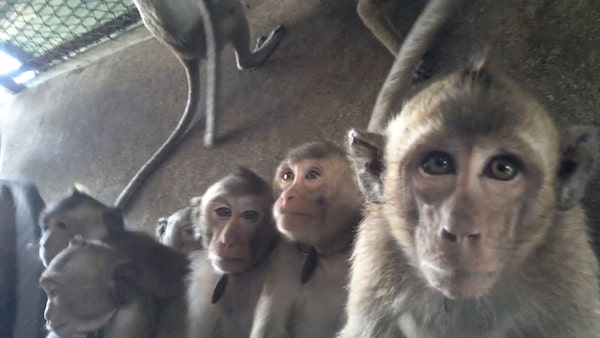
Long-tailed macaques at a monkey farm in Cambodia.Handout
Canada should follow the lead of the United States and refuse to approve the import of Cambodian monkeys for use in Canadian labs, animal-welfare groups say.
The U.S. Fish and Wildlife Service has been denying permits for the import of Cambodian macaques after an investigation found evidence that thousands of monkeys caught in the wild have been smuggled to the U.S. from Cambodia.
Animal-welfare groups are asking Ottawa to deny approvals here, warning some monkeys being imported could have been illegally caught in the wild and passed off as captive-bred. They fear that Cambodian macaques are now being diverted for testing in Canada, which has seen a huge increase in imports this year.
Import data published by the federal Department of Innovation and Science show that in December, the import of live Cambodian primates to Canada was worth US$608,000. By May, the value of imports rose to US $11.7-million. In June, imports were worth US$9.6-million and in July, US$11.6-million.
Canada should heed the U.S. “concerns over the origin of long-tailed macaques exported from Cambodia, and take action to stop their importation into the country,” said Sarah Kite, co-founder of global watchdog Action for Primates.
The long-tailed macaque is the most heavily traded non-human primate species and the most widely used for research and toxicity testing. It is protected under the Convention on International Trade of Endangered Species of Wild Fauna and Flora (CITES), with exporting countries requiring permits issued by CITES authorities.
Macaques are used in preclinical trials of drugs to treat illnesses such as cancer, diabetes and rare diseases.
Banning cosmetic testing on animals step toward ending more animal tests: minister
The U.S. investigation led to charges being filed by the Department of Justice in November against several people in Cambodia, including two wildlife officials, with a trial pending.
The indictment in the Southern District of Florida details an alleged conspiracy between high-ranking Cambodian officials with oversight for controlling the trade in endangered species and a Hong Kong company to smuggle wild macaques to the U.S. as captive-bred.
The indictment says Cambodian monkey farms may have euthanized captive-bred animals found unsuitable for export and transferred their identification tags to wild-caught macaques. Their CITES permits falsely identified them as captive-bred. The indictment lists 2,600 wild macaques suspected of entering the U.S. on false permits since 2018.
The U.S.-based National Association for Biomedical Research has expressed concern about the impact on research on drugs and vaccines of denying exports from Cambodia. It said in a briefing that “the U.S. Fish and Wildlife Service has denied the export of any NHP [non-human primate] originating from Cambodia, as well as any tissue sample or blood serum sample from any research animal originating from Cambodia.”
Amy Meyer, primate trade expert at People for the Ethical Treatment of Animals (PETA), said the supply of monkeys to labs is worth “huge money,” with a live monkey fetching as much as US$30,000 each.
She said the U.S. government’s refusal of import permits may have fuelled the big rise in macaque imports from Cambodia to Canada. She called on Ottawa to halt imports immediately.
A U.S. Fish and Wildlife Service letter, seen by The Globe and Mail, refuses an application to re-export biological samples from Cambodian macaques on the grounds that authorities cannot determine if the “specimens were legally acquired” under CITES.
“As a party to CITES, the Service is required to uphold our CITES obligations. This includes not allowing wild-caught macaques to be illegally imported or exported into or out of the U.S. in violation of the treaty,” said Christina Meister of the U.S. Fish and Wildlife Service.
PETA said it was impossible to know if monkeys imported to Canadian labs – including those operating on both sides of the border – are smuggled from the wild or not.
Several flights carrying macaques have arrived in Montreal since May, including one scheduled for the beginning of September. The journey can take up to 30 hours with four flights and three stopovers in Delhi, Tbilisi and Reykjavik.
The Canada Border Services Agency said its officers make sure when a shipment arrives that it is accompanied by necessary permits and certificates, including a CITES permit. It also checks the welfare of the animals, said spokeswoman Rebecca Purdy.
Environment and Climate Change Canada, which is responsible for verifying CITES permits are genuine, said it was aware of the U.S. investigation.
“Canada has not encountered the issue of live macaques coming from Cambodia to be used in biomedical research laundered into the trade recently,” said spokesperson Nicole Allen.
The Canadian Council on Animal Care, which oversees the welfare of animals in labs, says non-human primates should be captive-bred and acquired from a location that minimizes travel time. In exceptional circumstances where wild-caught animals are required for a research project and there are no alternatives, “sufficient scientific justification and the details of the capture method” must be provided to the CCAC’s animal-care committee for approval.
Pierre Verreault, CCAC executive director, said in an interview that when it came to importing wild-caught primates, “it would be really hard for me to say it’s not happening” though most primates used in labs are produced on farms and imported.
“Nobody will tell you we have wild-caught these primates and sold them to you,” he added.